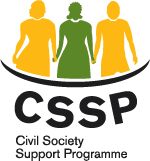
The Civil Society Support Programme (CSSP) is a multi donor fund supporting civil society capacity development in Ethiopia. The first phase of the programme (CSSP1, 2011-2017) provided grant-funding and capacity development opportunities to 513 civil society organisations from across all regions of Ethiopia. CSSP1 was managed by a consortium, led by the British Council (Ethiopia) and funded by seven international donors including IrishAid, UKAID, Canada, the Dutch, Danish and Norwegian MFAs and SIDA.
The programme took an innovative approach to supporting constructive engagement between civil society and government at a local level. This was based on a strong and ongoing political economy analysis through the life of the programme and the creation of a distinct culture focused on prioritising hard-to-reach people, issues and geographic areas.
INTRAC provided the following support to the programme over a six year period:
- Thought leadership and key input into the design of the programme
- Team leader [Inception]/Strategic Adviser Role to the CSSP team [2012-2016] including analysis of the political space that the programme was working in and support to the national team to navigate it.
- Technical Advice and design of the capacity development components with a focus on:
- Leadership as a vital component of civil society development and change.
- Financial integrity using a sustained and whole organization approach to financial management as a key element in the legitimacy of CSOs both with government, funders but also their own constituencies.
- Programme design moving away from managerial approaches to a focus on understanding of social exclusion, how change happens, and building coalitions/collaborations with others including fostering constructive engagement with government
- Gender and inclusion using culturally sensitive approaches
- Technical Advice on M&E at strategic level
- Strategic oversight (internal governance)
- Gender and inclusion expertise
The capacity development programme included training but this was complemented by other methods such as mentoring, strong accompaniment by programme staff and learning events. There was also an emphasis on supporting national level capacity development ‘suppliers’ including: collaboration with local providers working on leadership; a programme developing a group of Ethiopian financial mentors with Mango; exchange with Ugandan programme Raising Voices (SASA!) on gender, and capacity development of the national Ethiopian team to support partners on programme design
Two extracts from the year-long semi-external Results Review sum up some of the achievements of CSSP1 in relation to engagement with government and civil society capability:
Government was catalysed by CSSP to think differently. Government tended to look as if everyone is equal on the ground because of its laws. Now it is the CSOs which are bringing to government the deep-rooted issues. The physical presence of CSSP made a difference. CSSP supported [NGO-Gov fora in the regions] to be consultative rather than combative. The environment has forced CSOs to avoid advocacy – but this could have meant avoiding engagement altogether. Instead, collaborative space was utilised; engagement happened and people learned together because the nature of the discourse was different – modelled by CSSP.”
The capacity development aspect has done impressive work. If we take PAD in Diredawa – the CSSP Innovative Grant was its first. They would not have survived without it. Now it has 4-5 other donors and has become a stronger local NGO. Take BGDAN – only 2 staff at the beginning and now stronger with 13 staff. These organisations have been helped to identify very important issues and to develop strengths to tap resources and learned how to work with government.